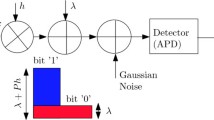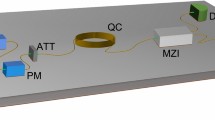Abstract
By theoretical calculation and analysis, this paper studies the influence of stochastic fiber dispersion on interference stability and erroneous detected rate of quantum key distribution (QKD) system receiver, and analyses its effects on quantum key generation rates of decoy states QKD. The result shows that the interference contrast and erroneous detected rate of the system will be affected by real part only but not by imaginary part only. However, when the real part exists, the imaginary part will have an effect on the interference contrast and erroneous detected rate.
Similar content being viewed by others
References
Bennett C H, Brassard G. Public key distribution and coin tossing. In: Proceedings of IEEE International Conference on Computers Systems and Signal Processing, Bangalore, 1984. 175–179
Mayer D. Unconditional security in quantum cryptography. JACM, 2001, 48: 351–406
Shor P W, Preshill J. Simple proof of security of the BB84 quantum key distribution protocol. Phys Rev Lett, 2000, 85: 441–444
Deutsch D, Ekert A, Jozsa R, et al. Quantum privacy amplification and the security of quantum cryptography over noisy channels. Phys Rev Lett, 1996, 77: 2818–2821
Scarani V, Acin A, Ribordy G, et al. Quantum cryptography protocols robust against photon number splitting attacks for weak laser pulse implementations. Phys Rev Lett, 2004, 92: 057901
Hwang W Y. Quantum key distribution with high loss: toward global secure communication. Phys Rev Lett, 2003, 91: 057901
Wang X B. Beating the photon-number-splitting attack in practical quantum cryptography. Phys Rev Lett, 2005, 94: 230503
Wang X B. Erratum: decoy-state protocol for quantum cryptography with four different intensities of coherent light. Phys Rev A, 2005, 72: 049908
Lo H K, Ma X F, Chen K. Decoy state quantum key distribution. Phys Rev Lett, 2005, 94: 230504
Ma X F, Qi B, Zhao Y, et al. Practical decoy state for quantum key distribution. Phys Rev A, 2005, 72: 012326
Mi J L, Wang F Q, Lin Q Q, et al. Decoy state quantum key distribution with dual detectors heralded single photon source(in Chinese). Acta Phys Sin, 2008, 57: 678–684
Hu H P, Wang J D, Huang Y X, et al. Nonorthogonal decoy-state quantum key distribution based on conditionally prepared down-conversion source(in Chinese). Acta Phys Sin, 2010, 59: 287–292
Martinelli M. A universal compensator for polarization changes induced by birefringence on a retracing beam. Opt Commun, 1989, 72: 341–344
Muller A, Herzog T, Huttner B, et al. “Plug and play” systems for quantum cryptography. Appl Phys Lett, 1997, 70: 793–795
Zheng L M, Wang F Q, Liu S H. The inlluence of dispersion and loss on quantum key distribution system(in Chinese). Acta Phys Sin, 2007, 56: 2180–2183
Yang X L, Wen Y J, Zhang M D. The influence of stochastic dispersion on optical soliton system and its suppression. Sci China Ser A Math, 1995, 38: 1127–1134
Elgin J N. Stochastic perturbations of optical solitons. Phys Lett A, 1993, 181: 54–60
Elgin J N, Kelly S M J. Spectral modulation and the growth of resonant modes associated with periodically amplified solitons. Opt Lett, 1993, 18: 787–789
Author information
Authors and Affiliations
Corresponding author
Rights and permissions
About this article
Cite this article
Jin, W., Zheng, L., Wang, F. et al. The influence of stochastic dispersion on quantum key distribution system. Sci. China Inf. Sci. 56, 1–6 (2013). https://doi.org/10.1007/s11432-012-4586-7
Received:
Accepted:
Published:
Issue Date:
DOI: https://doi.org/10.1007/s11432-012-4586-7




